|
|
|
Sort Order |
|
|
|
Items / Page
|
|
|
|
|
|
|
| Srl | Item |
| 1 |
ID:
090210


|
|
|
|
|
| Publication |
2009.
|
| Summary/Abstract |
This article argues that the chiefs' tyranny in early colonial Kenya had its roots in the British administrative style since the Government needed strong-handed local leaders to enforce its unpopular laws and regulations. That was why the chiefs got away with their tyranny because the Government condoned it to a certain extent. They also got away with it because of the alien nature of their positions, their duties and their people inadvertently condoning it. The first generation of chiefs from Kiambu district is used as a case study to illustrate what was happening in the colony during the period under study.
|
|
|
|
|
|
|
|
|
|
|
|
|
|
|
|
| 2 |
ID:
096688
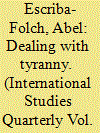

|
|
|
|
|
| Publication |
2010.
|
| Summary/Abstract |
This paper examines whether economic sanctions destabilize authoritarian rulers. We argue that the effect of sanctions is mediated by the type of authoritarian regime against which sanctions are imposed. Because personalist regimes and monarchies are more sensitive to the loss of external sources of revenue (such as foreign aid and taxes on trade) to fund patronage, rulers in these regimes are more likely to be destabilized by sanctions than leaders in other types of regimes. In contrast, when dominant single-party and military regimes are subject to sanctions, they increase their tax revenues and reallocate their expenditures to increase their levels of cooptation and repression. Using data on sanction episodes and authoritarian regimes from 1960 to 1997 and selection-corrected survival models, we test whether sanctions destabilize authoritarian rulers in different types of regimes. We find that personalist dictators are more vulnerable to foreign pressure than other types of dictators. We also analyze the modes of authoritarian leader exit and find that sanctions increase the likelihood of a regular and an irregular change of ruler, such as a coup, in personalist regimes. In single-party and military regimes, however, sanctions have little effect on leadership stability.
|
|
|
|
|
|
|
|
|
|
|
|
|
|
|
|
| 3 |
ID:
148648
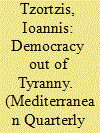

|
|
|
|
|
| Summary/Abstract |
This essay presents the findings of comparative research on democratic transitions by reforma in Greece, Spain, and Turkey but in a framework not previously used and one rather different from the one established in the now-classical study of democratic transitions set by Guillermo O’Donnell and Laurence Whitehead in the 1980s. The departing point of this comparative approach is a case unknown to many: the ill-fated 1973 Greek attempt at self-transformation, known as “the Markezinis experiment” after Spyros Markezinis, who assumed the task of bringing the country to democracy in the way Adolfo Suárez González would do in Spain four years later. The attempt stalled before it was ended by a coup organized by the regime hard-liners tacitly backed by the military as an institution. The cases compared include Spain and Turkey, which underwent similar transitions, but with very different outcomes: consolidated democracy and “difficult democracy,” respectively. The reasons are sought in the different regime natures and elite and counterelite choices.
|
|
|
|
|
|
|
|
|
|
|
|
|
|
|
|
| 4 |
ID:
169349


|
|
|
|
|
| Summary/Abstract |
The extreme conditions of all extraterrestrial environments restrict freedom of movement and encourage social, political and economic arrangements friendly to tyranny. However, deliberately engineered measures might be taken to maximise liberty in the space environment. For example, space settlements can be engineered to maximise the number of oxygen, food, water and power systems to disallow coercive regimes the opportunity to control single machines on which entire settlements depend. Spacesuits can be engineered to be easily manufactured and maintained, thus maximising the number available to occupants of a settlement and minimising the extent to which bespoke and difficult-to-service suits restrict freedom of movement. Other examples of this approach to engineering are provided, which we might term ‘freedom engineering’. Although attempts to deliberately engineer freedom into a settlement turn on the definition of ‘freedom’, it is suggested that objective criteria in the enhancement of certain types of individual and collective liberty can be used to determine when an act of freedom engineering is likely to be beneficial for a settlement. The space policy implications of these ideas are discussed.
|
|
|
|
|
|
|
|
|
|
|
|
|
|
|
|
| 5 |
ID:
085003
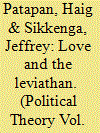

|
|
|
|
|
| Publication |
2008.
|
| Summary/Abstract |
Hobbes's understanding of love, and its significance for his political thought, has received insufficient attention. This essay contends that Hobbes has a consistent and comprehensive teaching on love that directly repudiates what he regards as the Platonic teaching on eros. In attacking the Platonic idea of eros, Hobbes undermines a pillar of classical political philosophy and articulates a significant aspect of his new understanding of the passions in terms of power, which is itself a critical part of his new political science most famously presented in Leviathan
|
|
|
|
|
|
|
|
|
|
|
|
|
|
|
|
| 6 |
ID:
085338
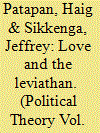

|
|
|
|
|
| Publication |
2008.
|
| Summary/Abstract |
Hobbes's understanding of love, and its significance for his political thought, has received insufficient attention. This essay contends that Hobbes has a consistent and comprehensive teaching on love that directly repudiates what he regards as the Platonic teaching on eros. In attacking the Platonic idea of eros, Hobbes undermines a pillar of classical political philosophy and articulates a significant aspect of his new understanding of the passions in terms of power, which is itself a critical part of his new political science most famously presented in Leviathan.
|
|
|
|
|
|
|
|
|
|
|
|
|
|
|
|
| 7 |
ID:
115734
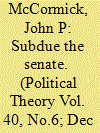

|
|
|
|
|
| Publication |
2012.
|
| Summary/Abstract |
This article analyzes Machiavelli's accounts of the historical figures Agathocles, Clearchus, Appius and Pacuvius to (1) accentuate the Florentine's distinction between tyranny and civic leadership, (2) identify the proper place of elite punishment and popular empowerment in his conception of democratic politics, and (3) criticize contemporary Straussian and "radical" interpreters of Machiavelli for profoundly underestimating the roles that popular judgment and popular rule play within his political thought.
|
|
|
|
|
|
|
|
|
|
|
|
|
|
|
|
| 8 |
ID:
167840
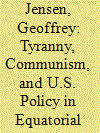

|
|
|
|
|
| Summary/Abstract |
This study of Washington’s dealings with Equatorial Guinea under the rule of one of modern Africa’s most brutal dictators, Francisco Macías Nguema, analyzes US perceptions and policies relating to communist intervention, human rights, and related geopolitical issues during the Nixon, Ford, and Carter presidencies. It also sheds light on the relationships and conflicts between the Soviet Union, China, and Cuba in Africa. In addition, it offers new perspectives on Cuba’s close ties to the dictatorship of Francisco Macías Nguema and on the possible role of international actors in his downfall in 1979.
|
|
|
|
|
|
|
|
|
|
|
|
|
|
|
|
|
|
|
|
|